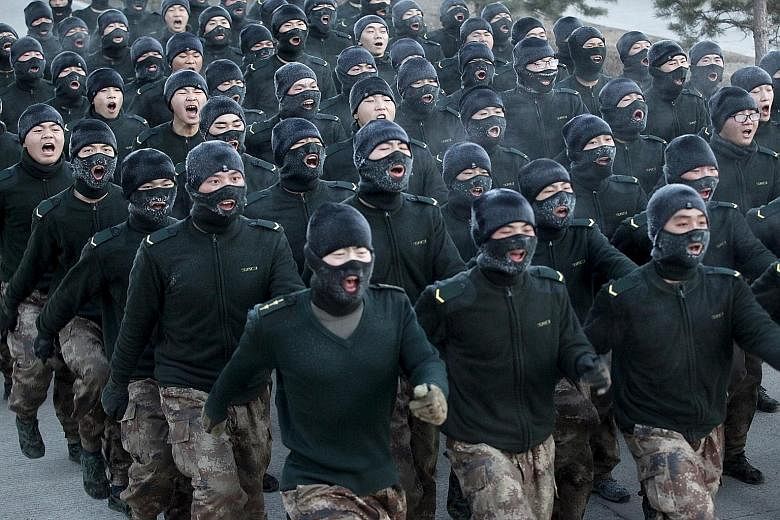China's economic clout in the region looks set to increase this year, despite its growth slowing further, analysts say.
This could give President Xi Jinping a lift as he pushes on with tough military reforms and an anti-corruption drive, ahead of a major leadership transition next year.
The slowing gross domestic product (GDP) growth could be the trickiest economic issue for Beijing this year, noted Asian political economy expert Ramon Pacheco Pardo from King's College London. "While the slowdown was expected by the government, its speed and extent were not," he told The Sunday Times.
Indeed, despite its leaders pledging to be less obsessed about growth, China still spent much of last year preoccupied with hitting its 7 per cent target. That will likely continue this year, although economists predict China will set a lower target of 6.5 to 7 per cent.
But China's diminished economic strength will not weaken its regional clout, in a year when it is president of the Group of 20 major economies, and when the Asian Infrastructure Investment Bank (AIIB) it leads will begin disbursing funds. Indonesia, which needs around US$450 billion (S$639 billion) for transport and power networks, could be the recipient of the bank's first loan, in the face of competition from the Philippines, Vietnam and India, observers say.
-
The year ahead
-
• AIIB to disburse first funds
• Beginning of military reform
• Acceleration of government anti-graft inspections
Dr Pardo also believes Beijing will assert influence farther afield this year by promoting in earnest its "One Belt, One Road" (OBOR) initiative beyond its immediate borders, through the signing of investment projects in Europe, Australia and other regions in which it has traditionally had less of a presence.Singapore's third government-linked project with China in western Chongqing city is among OBOR's initiatives, and the first details of its implementation can be expected early this year, Chongqing-based sources told The Sunday Times.
The external developments will occur alongside challenging domestic reforms to the economy and military. Mr Xi had announced last November the modernisation of the People's Liberation Army's (PLA) command structure, which is likely to face internal resistance when it is carried out this year .
There will, however, be less impediment to Mr Xi's other policy cornerstone. The anti-graft agency, the Central Commission for Discipline Inspection (CCDI), announced last month plans to complete inspection of all 280 government units, such as state-owned enterprises and financial institutions, by next year. This amounts to an acceleration of the campaign, as the CCDI has inspected only about half that number in the preceding three years.
The CCDI's stated aim is to complete inspections by the 19th Congress of the Chinese Communist Party next year, which will provide clues to China's next slate of top leaders. In the lead-up to that event, the party will hope to present a united front, even as potential candidates begin jockeying to replace those retiring.
China analyst Steve Tsang expects the hunt for the biggest "tigers" or leaders to be over already, after the fall of former Politburo Standing Committee member Zhou Yongkang last year. "To keep doing so at the very senior level will discredit the party, which is the last thing Xi wants," he reasoned. "He also needs to minimise resistance and maximise cooperation from the top echelons."
Also notable will be how Mr Xi commemorates the 50th anniversary of the Cultural Revolution this year, amid published confessions in recent years by former Red Guards, reflecting what appears to be a groundswell of revisionism about the tumultuous period.
As for territorial disputes in the region, tensions are expected to remain high, amid continued reclamation works by China and "freedom of navigation" exercises by the US.
Some observers worry about China declaring an air defence identification zone in the South China Sea, as it did in 2013 in the East China Sea, where it has a territorial dispute with Japan. But Asean expert Xu Liping feels China will be less antagonistic in the coming year, given the backlash it has felt from its neighbours over its growing assertiveness in its territorial claims. China has appeared to repair ties with Japan and Vietnam in the past year.
Still, the Philippines will be eagerly awaiting the results of the international arbitration case that it has brought to The Hague, against China's claims in the South China Sea. A verdict is expected this year and could pile more pressure on China, if the court rules in the Philippines' favour.

